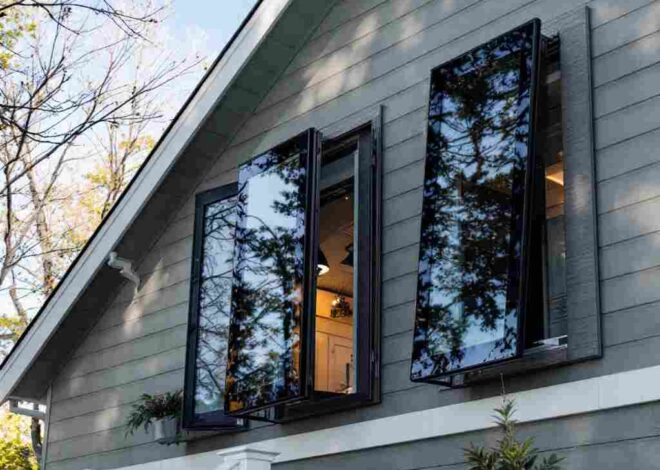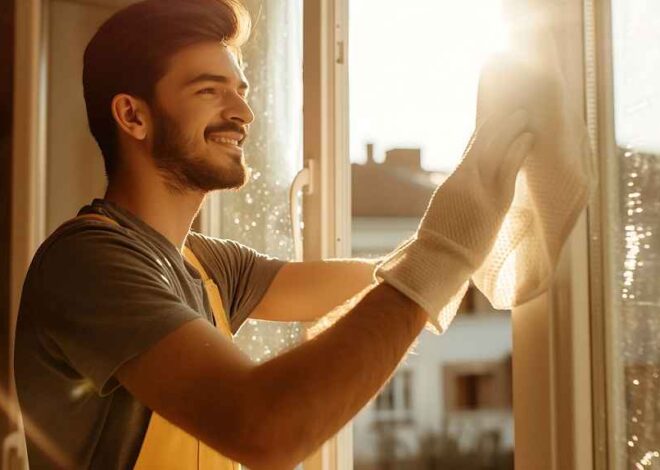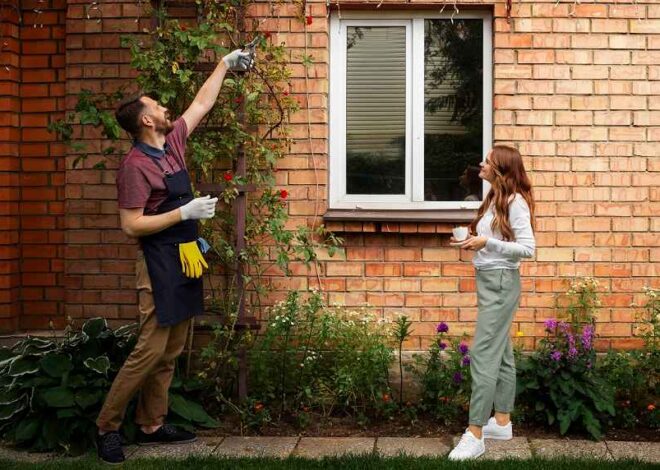
Don’t Let Old Windows Hold You Back: A Beginner’s Guide to Window Replacement
Are you tired of dealing with drafty windows that just won’t keep out the cold? It may be time to say goodbye to your old windows and hello to new, energy-efficient replacements. In this beginner’s guide, we’ll walk you through everything you need to know about replacing your old windows and upgrading your home’s efficiency and aesthetics. Don’t let outdated windows hold you back any longer – it’s time for a fresh start!
Introduction: The importance of windows in a home
Windows play a vital role in our homes, offering views of the outside world while letting in natural light and fresh air. However, old windows can hold us back from fully enjoying these benefits. If you find yourself peering through foggy glass or feeling drafts on chilly days, it might be time to consider a window replacement. Let’s dive into this beginner’s guide to help you understand why upgrading your windows can make a significant difference in your home!
Why should you consider replacing old windows?
Old windows may seem like a small detail in your home, but they play a significant role in both aesthetics and functionality. Over time, old windows can become drafty and inefficient, causing energy bills to skyrocket. By replacing them with modern, energy-efficient options, you can improve the overall comfort of your home while also saving money on heating and cooling costs.
Furthermore, outdated windows may not provide adequate security for your home. Newer window technologies offer enhanced safety features to protect your family and belongings from potential intruders. Additionally, replacing old windows can significantly enhance the curb appeal of your property, giving it a fresh look that will impress visitors and potential buyers if you ever decide to sell.
Don’t let old windows hold you back – consider investing in replacement windows to upgrade your living space today!
Signs that it’s time to replace your old windows
Are your old windows causing more trouble than they’re worth? It might be time for a replacement. One of the telltale signs is drafts or air leaks coming through the window frames, leading to increased energy bills and discomfort. Another indicator is if you notice condensation between the window panes, indicating seal failure.
If you struggle with opening or closing your windows, it’s a clear sign that they have outlived their usefulness. Warped frames or difficulty locking them properly can compromise your home’s security and insulation. Excessive outside noise filtering in through thin glass panes could also mean it’s time for an upgrade.
Visible damage like cracks, decay, or rot cannot be ignored as these issues not only affect aesthetics but also invite pests and moisture into your home. If you spot any of these warning signs, don’t hesitate to explore the option of replacing your old windows for improved comfort and efficiency.
Types of replacement windows available
When it comes to replacing old windows, you have a variety of options to choose from. One popular choice is energy-efficient windows, designed to help reduce your home’s energy consumption and lower utility bills. These windows are typically double or triple-pane with insulating gas fillings that provide better thermal efficiency.
Another consideration when selecting replacement windows is the style and material. You can opt for traditional styles like single-hung or double-hung windows, or go for modern options such as casement or awning windows. The materials range from vinyl, which is low-maintenance and cost-effective, to wood frames that offer a classic look but may require more upkeep.
Ultimately, the type of replacement window you choose will depend on your budget, aesthetic preferences, and desired level of energy efficiency. It’s essential to explore all available options before making a decision that best suits your needs and enhances the overall look and functionality of your home.
-
Energy-efficient options
When it comes to replacing your old windows, opting for energy-efficient options can make a significant difference in your home. Energy-efficient windows are designed to reduce heat transfer, keeping your home cooler in the summer and warmer in the winter.
These windows typically feature multiple panes of glass with special coatings that reflect heat back into the room while blocking harmful UV rays. Additionally, they are often filled with insulating gases like argon or krypton to further enhance their thermal performance.
By investing in energy-efficient windows, you can not only lower your utility bills but also reduce your carbon footprint by decreasing your reliance on heating and cooling systems. Plus, many energy-efficient window options are eligible for tax credits or rebates, providing an added incentive to make the switch.
-
Window styles and materials
When it comes to replacing your old windows, choosing the right window style and material is crucial.
Window styles vary from traditional double-hung and casement windows to modern picture or bay windows, each offering its unique benefits in terms of functionality and aesthetics. Consider how you want your new windows to complement your home’s overall design.
Materials play a significant role in the durability and energy efficiency of replacement windows. Options range from cost-effective vinyl to classic wood or low-maintenance fiberglass. Each material has its advantages, so weigh factors like maintenance requirements and longevity before making a decision.
Ultimately, selecting the perfect window style and material will not only enhance your home’s appearance but also improve its energy efficiency and value.
The process of window replacement
When it comes to replacing old windows, the process can seem daunting at first. The first step is to assess your current windows and determine if replacement is necessary. Look for signs of wear and tear such as drafts, condensation between panes, or difficulty opening and closing.
Next, consider whether you want to tackle the replacement yourself or hire a professional. DIY may save money but hiring a skilled contractor ensures proper installation. Research different window styles and materials to find the best fit for your home’s aesthetic and energy efficiency needs.
Cost considerations are important too – factor in not just the price of the windows themselves but also installation costs. Keep in mind that investing in quality replacement windows can lead to long-term savings on energy bills.
Overall, educating yourself on the process of window replacement will help you make informed decisions that enhance both your home’s functionality and appearance.
-
DIY or hiring a professional?
When it comes to replacing your old windows, one of the decisions you’ll need to make is whether to tackle the project yourself or hire a professional.
DIY window replacement can be a cost-effective option for those with handy skills and experience in home improvement projects. It allows you to have more control over the process and potentially save on labor costs.
However, hiring a professional window installer ensures that the job is done correctly and efficiently. They have the expertise, tools, and knowledge to handle any challenges that may arise during the installation process.
Keep in mind that improper installation can lead to air leaks, drafts, and even damage to your new windows. So, if you’re unsure about your abilities or don’t have the necessary tools, it’s best to leave it to the experts.
-
Cost and budget considerations
When it comes to replacing old windows, cost and budget considerations play a significant role in the decision-making process. Before starting the project, it’s essential to assess your financial situation and set a realistic budget.
The cost of window replacement can vary based on factors such as the size of your home, the type of windows you choose, and whether you opt for professional installation or go the DIY route. Researching different suppliers and comparing quotes can help you find affordable options that suit your budget.
Keep in mind that while upfront costs may seem high, investing in energy-efficient windows can lead to long-term savings on utility bills. Additionally, some local governments offer incentives or rebates for upgrading to eco-friendly windows, which can offset some of the initial expenses.
By carefully planning and evaluating your financial resources, you can ensure a smooth window replacement process without breaking the bank.
Benefits of replacing old windows
Replacing old windows can bring a multitude of benefits to your home. One major advantage is improved energy efficiency. New windows are designed with advanced technology to better insulate your home, reducing energy bills and creating a more comfortable living environment year-round.
Another perk of window replacement is the potential increase in home value. Modern, stylish windows enhance the overall look of your property, making it more attractive to potential buyers if you ever decide to sell.
Additionally, new windows can significantly boost curb appeal. They can freshen up the exterior appearance of your house, giving it a modern and updated feel that catches the eye of passersby.
Overall, investing in replacement windows not only improves the functionality of your home but also enhances its aesthetic appeal and resale value.
-
Improved energy efficiency
When it comes to considering window replacement, one significant benefit to keep in mind is the improvement in energy efficiency. Old windows can often be a source of drafts and air leakage, leading to increased energy bills as your heating or cooling system works harder to maintain a comfortable temperature inside your home.
By investing in new, energy-efficient windows, you can help reduce these issues significantly. Modern replacement windows are designed with advanced features like double or triple panes, low-emissivity coatings, and insulated frames that work together to minimize heat transfer and enhance insulation. This means a more consistent indoor temperature year-round without relying heavily on HVAC systems.
Not only does improved energy efficiency lead to cost savings on utility bills over time but it also contributes to reducing your carbon footprint by lowering overall energy consumption. So when you decide it’s time for window replacement, consider the long-term benefits of enhanced energy efficiency for both your wallet and the environment.
-
Increased home value
When it comes to increasing the value of your home, replacing old windows can make a significant impact. Updated and modern windows not only enhance the overall aesthetic appeal of your property but also attract potential buyers if you ever decide to sell.
Buyers often look for homes with energy-efficient features, and new windows can be a major selling point. The added benefit of improved insulation and reduced energy costs is not only appealing to you as a homeowner but also adds value when appraising your property.
Investing in replacement windows shows that you care about maintaining your home and keeping it in top condition. Potential buyers are more likely to offer higher bids on a well-maintained home with updated features like new windows.
Overall, replacing old windows can help boost the resale value of your home while providing immediate benefits such as enhanced comfort, improved aesthetics, and lower utility bills.
-
Enhanced curb appeal
Enhanced curb appeal By replacing your old windows with new, stylish options, you can significantly enhance the overall appearance of your home’s exterior. Whether you opt for classic double-hung windows or sleek casement windows, upgrading to modern designs can instantly boost your home’s curb appeal and make it stand out in the neighborhood. With a fresh and updated look, you’ll not only impress visitors but also potentially increase the resale value of your property. So don’t let old windows hold you back – consider replacement today for a more energy-efficient, attractive, and valuable home!


